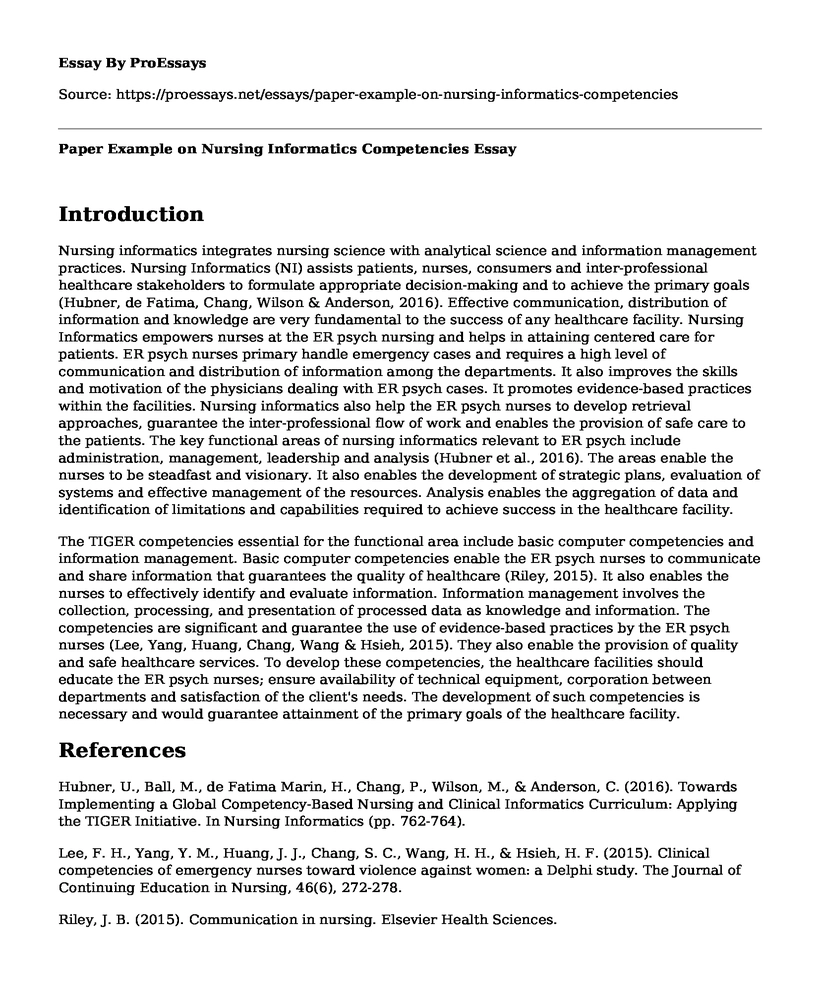Introduction
Nursing informatics integrates nursing science with analytical science and information management practices. Nursing Informatics (NI) assists patients, nurses, consumers and inter-professional healthcare stakeholders to formulate appropriate decision-making and to achieve the primary goals (Hubner, de Fatima, Chang, Wilson & Anderson, 2016). Effective communication, distribution of information and knowledge are very fundamental to the success of any healthcare facility. Nursing Informatics empowers nurses at the ER psych nursing and helps in attaining centered care for patients. ER psych nurses primary handle emergency cases and requires a high level of communication and distribution of information among the departments. It also improves the skills and motivation of the physicians dealing with ER psych cases. It promotes evidence-based practices within the facilities. Nursing informatics also help the ER psych nurses to develop retrieval approaches, guarantee the inter-professional flow of work and enables the provision of safe care to the patients. The key functional areas of nursing informatics relevant to ER psych include administration, management, leadership and analysis (Hubner et al., 2016). The areas enable the nurses to be steadfast and visionary. It also enables the development of strategic plans, evaluation of systems and effective management of the resources. Analysis enables the aggregation of data and identification of limitations and capabilities required to achieve success in the healthcare facility.
The TIGER competencies essential for the functional area include basic computer competencies and information management. Basic computer competencies enable the ER psych nurses to communicate and share information that guarantees the quality of healthcare (Riley, 2015). It also enables the nurses to effectively identify and evaluate information. Information management involves the collection, processing, and presentation of processed data as knowledge and information. The competencies are significant and guarantee the use of evidence-based practices by the ER psych nurses (Lee, Yang, Huang, Chang, Wang & Hsieh, 2015). They also enable the provision of quality and safe healthcare services. To develop these competencies, the healthcare facilities should educate the ER psych nurses; ensure availability of technical equipment, corporation between departments and satisfaction of the client's needs. The development of such competencies is necessary and would guarantee attainment of the primary goals of the healthcare facility.
References
Hubner, U., Ball, M., de Fatima Marin, H., Chang, P., Wilson, M., & Anderson, C. (2016). Towards Implementing a Global Competency-Based Nursing and Clinical Informatics Curriculum: Applying the TIGER Initiative. In Nursing Informatics (pp. 762-764).
Lee, F. H., Yang, Y. M., Huang, J. J., Chang, S. C., Wang, H. H., & Hsieh, H. F. (2015). Clinical competencies of emergency nurses toward violence against women: a Delphi study. The Journal of Continuing Education in Nursing, 46(6), 272-278.
Riley, J. B. (2015). Communication in nursing. Elsevier Health Sciences.
Cite this page
Paper Example on Nursing Informatics Competencies. (2022, Jun 15). Retrieved from https://proessays.net/essays/paper-example-on-nursing-informatics-competencies
If you are the original author of this essay and no longer wish to have it published on the ProEssays website, please click below to request its removal:
- Communication in Public Health. Essay Example.
- Policies Regarding Type 2 Diabetes Paper Example
- Essay Sample on Nursing Education
- Determinants of Good Health - Essay Sample
- Research Paper on Supply and Demand in Public Health
- Paper Example on Physical Therapy: An Important Well-Being Occupation
- Essay Sample on Healthcare System







